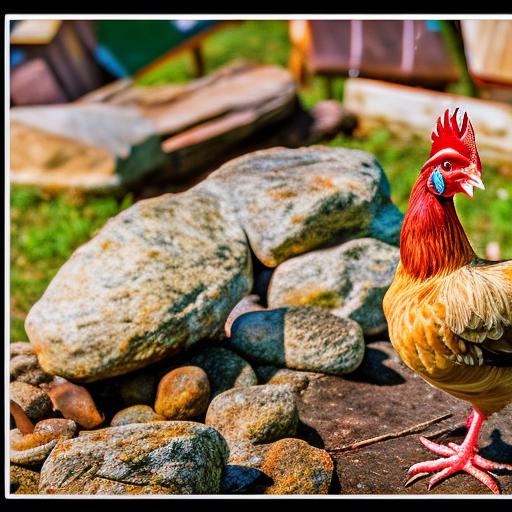Backyard chicken keeping has become increasingly popular in Greenville, SC in recent years. Many residents are discovering the joys and benefits of raising their own chickens and enjoying the fresh eggs they produce. I personally have experienced the satisfaction of having a backyard flock and reaping the rewards of their delicious eggs. In this article, we will explore the regulations for keeping chickens in Greenville, the benefits of raising chickens in your backyard, how to choose the right breed, setting up a chicken coop, feeding and caring for your chickens, common issues and problems, keeping chickens safe from predators, harvesting eggs, connecting with the local chicken-raising community, and how backyard chicken keeping fits into the larger sustainable living movement.
Key Takeaways
- Regulations for keeping chickens in Greenville, SC include obtaining a permit, limiting the number of chickens, and providing proper housing and care.
- Raising chickens in your backyard in Greenville, SC can provide fresh eggs, natural pest control, and a fun hobby for the whole family.
- Choosing the right breed of chicken for your Greenville home depends on factors such as egg production, temperament, and climate adaptability.
- Setting up a chicken coop in Greenville, SC requires proper ventilation, insulation, and protection from predators.
- Feeding and caring for your chickens in Greenville, SC involves providing a balanced diet, clean water, and regular health check-ups.
Regulations for Keeping Chickens in Greenville, SC
Before starting your own backyard flock in Greenville, it is important to familiarize yourself with the city’s regulations on chicken keeping. The city allows residents to keep up to six hens (no roosters) on properties that are at least 7,500 square feet in size. If your property is smaller than that, you may need to obtain a variance from the city’s Board of Zoning Appeals. Additionally, you will need to obtain a permit from Animal Control and pay an annual fee. It is also important to note that chickens must be kept in a secure coop or enclosure at all times and must be provided with proper care and attention.
To obtain the necessary permits and licenses for keeping chickens in Greenville, you will need to fill out an application with Animal Control. The application will require information such as your name, address, contact information, and details about your coop and flock. You may also be required to provide a sketch or diagram of your property showing the location of the coop. Once your application is submitted, Animal Control will review it and may conduct an inspection of your property before issuing the permit.
Benefits of Raising Chickens in Your Backyard in Greenville, SC
There are numerous benefits to raising chickens in your backyard in Greenville. One of the main benefits is the health benefits of consuming fresh eggs. Eggs from backyard chickens are often considered to be healthier than store-bought eggs because they are typically higher in nutrients and lower in cholesterol. Additionally, backyard chickens are typically raised in a more natural and humane environment, which can result in healthier and more flavorful eggs.
Another benefit of raising chickens in your backyard is the cost savings compared to store-bought eggs. While there is an initial investment required to set up a coop and purchase chickens, the ongoing costs of feeding and caring for them are relatively low. In fact, many chicken keepers find that their flock pays for itself through the savings on eggs. Additionally, raising your own chickens allows you to have a constant supply of fresh eggs, eliminating the need to purchase them from the store.
Raising chickens in your backyard also provides educational opportunities for children. Children can learn about responsibility, animal care, and where their food comes from by participating in the care of the chickens. They can also learn about the life cycle of chickens and witness firsthand the process of egg production. This hands-on learning experience can be both fun and educational for children of all ages.
Choosing the Right Breed of Chicken for Your Greenville Home
When choosing a breed of chicken for your Greenville home, there are several factors to consider. One factor is the climate and weather conditions in Greenville. Some breeds are better suited to hot climates, while others are better suited to cold climates. It is important to choose a breed that can tolerate the weather conditions in your area.
Another factor to consider is the purpose of keeping chickens. If you are primarily interested in egg production, you will want to choose a breed that is known for its egg-laying abilities. Some popular egg-laying breeds include Rhode Island Reds, Leghorns, and Australorps. If you are interested in meat production, you will want to choose a breed that is known for its meat quality, such as Cornish Cross or Plymouth Rock.
Other factors to consider when choosing a breed include temperament, size, and appearance. Some breeds are more docile and friendly, while others are more flighty and independent. Some breeds are larger and require more space, while others are smaller and can be kept in smaller coops. Additionally, some breeds have unique and attractive feather patterns or colors.
Setting Up a Chicken Coop in Greenville, SC
Setting up a chicken coop is an important step in backyard chicken keeping. When selecting a location for your coop, it is important to choose a spot that is well-drained and provides protection from the elements. The coop should be placed in an area that receives adequate sunlight and is away from any potential hazards or predators.
When building a chicken coop, there are several materials that you will need. These include lumber for the frame, wire mesh for the walls and windows, roofing material for the roof, and nesting boxes and perches for the interior. It is important to use sturdy materials that can withstand the elements and provide adequate protection for your chickens.
Maintenance and cleaning requirements for a chicken coop include regular cleaning of the coop and nesting boxes to prevent the buildup of waste and bacteria. The coop should be cleaned out at least once a week, with soiled bedding replaced with fresh bedding. Additionally, the coop should be inspected regularly for any signs of damage or wear and tear.
Feeding and Caring for Your Chickens in Greenville, SC

Feeding and caring for your chickens is an important part of backyard chicken keeping. Chickens have specific dietary needs that must be met in order to keep them healthy and productive. A balanced diet for chickens includes a combination of commercial feed, fresh fruits and vegetables, and access to forage.
Commercial feed is the main source of nutrition for chickens and should make up the majority of their diet. There are different types of feed available, including starter feed for young chicks, grower feed for adolescent chickens, and layer feed for adult hens. It is important to choose a high-quality feed that is appropriate for the age and stage of your chickens.
In addition to commercial feed, chickens should also be provided with fresh fruits and vegetables as treats. These can include scraps from your own kitchen, such as carrot peels, apple cores, and lettuce leaves. It is important to avoid feeding chickens any toxic or harmful foods, such as chocolate, onions, or avocado.
Proper care and attention are also important for keeping chickens healthy and happy. Chickens should be provided with clean water at all times, as well as a clean and comfortable living environment. They should also be protected from extreme weather conditions and predators. Regular health checks should be conducted to ensure that chickens are free from parasites or diseases.
Common Issues and Problems When Keeping Chickens in Greenville, SC
While backyard chicken keeping can be a rewarding experience, there are some common issues and problems that can arise. One common issue is the spread of diseases among the flock. Chickens can be susceptible to various diseases and parasites, such as mites, lice, and respiratory infections. It is important to monitor your flock regularly for any signs of illness and take appropriate measures to prevent and treat these issues.
Another common problem is predators. Greenville is home to a variety of predators that can pose a threat to backyard chickens, including raccoons, foxes, and hawks. It is important to secure the coop and run with sturdy fencing and wire mesh to prevent predators from gaining access. Additionally, it is important to provide adequate shelter and protection for the chickens within the coop.
Other common issues include egg production problems, such as low egg production or egg eating, as well as behavioral issues, such as aggression or feather picking. These issues can often be addressed through proper nutrition, environmental enrichment, and addressing any underlying health or behavioral issues.
Keeping Chickens Safe from Predators in Greenville, SC
Keeping chickens safe from predators is a top priority for backyard chicken keepers in Greenville. There are several common predators in the area that can pose a threat to chickens, including raccoons, foxes, coyotes, and hawks. It is important to take appropriate measures to secure the coop and protect the chickens from harm.
One of the most effective ways to protect chickens from predators is to provide a secure coop and run. The coop should be made of sturdy materials and have a secure locking mechanism to prevent predators from gaining access. The run should be enclosed with wire mesh that is buried at least 12 inches deep to prevent predators from digging under.
It is also important to provide adequate shelter and protection within the coop. This can include nesting boxes that are elevated off the ground and perches that are high enough to keep chickens out of reach of predators. Additionally, it is important to close the coop at night to prevent predators from entering.
Other measures that can be taken to deter predators include installing motion-activated lights or alarms, using predator deterrents such as coyote urine or predator decoys, and keeping the area around the coop clear of brush or debris that could provide cover for predators.
Harvesting Eggs from Your Backyard Chickens in Greenville, SC
Harvesting eggs from your backyard chickens is one of the most rewarding aspects of chicken keeping. In order to ensure that eggs are fresh and safe to consume, it is important to collect them regularly and handle them properly.
Eggs should be collected at least once a day to prevent them from becoming dirty or damaged. It is best to collect eggs in the morning when they are still fresh and cool. When collecting eggs, it is important to handle them gently and avoid dropping or jostling them, as this can cause cracks or breakages.
After collecting eggs, they should be stored in a cool and dry place. It is best to store eggs in a refrigerator, as this will help to maintain their freshness and prevent the growth of bacteria. Eggs should be stored with the pointed end down to help keep the yolk centered and prevent it from touching the shell.
Fresh eggs can be used in a variety of ways, from simple scrambled eggs to baked goods and desserts. They can also be shared with friends and neighbors or used as a bartering tool. The possibilities are endless when it comes to using fresh eggs from your backyard flock.
Connecting with the Greenville, SC Chicken-Raising Community
In Greenville, there is a vibrant community of chicken keepers who are passionate about raising chickens and sharing their knowledge and experiences. Connecting with this community can provide valuable support and resources for backyard chicken keepers.
There are several local resources and organizations that cater to chicken enthusiasts in Greenville. These include local poultry clubs, online forums and social media groups, and educational workshops and events. These resources can provide information on topics such as breed selection, coop design, health care, and more.
Networking with other chicken keepers can also provide opportunities for sharing tips and advice, trading or selling chickens or eggs, and even arranging coop tours or meetups. It can be a fun and rewarding experience to connect with like-minded individuals who share a passion for raising chickens.
Exploring the Sustainable Living Movement in Greenville, SC through Chicken Keeping
Backyard chicken keeping is just one aspect of the larger sustainable living movement that is gaining momentum in Greenville. Sustainable living encompasses a wide range of practices that aim to reduce our impact on the environment and promote self-sufficiency.
By raising chickens in your backyard, you are taking a step towards sustainable living by producing your own food and reducing your reliance on store-bought eggs. Chickens also provide natural pest control and help to reduce food waste by consuming kitchen scraps and garden leftovers.
In addition to chicken keeping, there are many other sustainable practices that can be incorporated into your lifestyle in Greenville. These can include composting, rainwater harvesting, organic gardening, and energy conservation. By adopting these practices, you can reduce your carbon footprint and contribute to a more sustainable future.
In conclusion, backyard chicken keeping in Greenville, SC offers numerous benefits and joys. From the health benefits of consuming fresh eggs to the cost savings compared to store-bought eggs, there are many reasons to consider starting your own backyard flock. By following the city’s regulations, choosing the right breed, setting up a secure coop, providing proper care and attention, and connecting with the local chicken-raising community, you can enjoy the rewards of raising chickens in your own backyard. Additionally, backyard chicken keeping fits into the larger sustainable living movement and provides opportunities for incorporating other sustainable practices into your lifestyle. So why not give it a try and start your own backyard flock today?
If you’re considering keeping chickens in Greenville, SC, you may be wondering how many chickens you need for a family of four. Poultry Wizard has an informative article that answers this question and provides valuable insights into the ideal number of chickens to meet your family’s egg needs. Check out their article on “How Many Chickens Do You Need for a Family of 4?” to learn more about the considerations and factors involved in determining the right flock size.
FAQs
What are the regulations for keeping chickens in Greenville, SC?
According to the City of Greenville’s Code of Ordinances, residents are allowed to keep up to six chickens on their property as long as they meet certain requirements, such as providing adequate shelter and fencing.
Do I need a permit to keep chickens in Greenville, SC?
No, a permit is not required to keep chickens in Greenville, SC. However, residents must comply with the city’s regulations for keeping chickens.
What types of chickens are allowed in Greenville, SC?
There are no specific restrictions on the types of chickens that are allowed in Greenville, SC. However, residents should ensure that their chickens are not causing a nuisance to their neighbors.
What are the requirements for chicken coops in Greenville, SC?
Chicken coops in Greenville, SC must be located at least 25 feet from any neighboring residence and must be constructed in a way that prevents chickens from escaping. Coops must also be kept clean and free of odors.
Can I sell eggs from my chickens in Greenville, SC?
Yes, residents are allowed to sell eggs from their chickens in Greenville, SC as long as they comply with state and local regulations for food sales.
What should I do if my neighbors complain about my chickens?
If your neighbors complain about your chickens, you should try to address their concerns and ensure that your chickens are not causing a nuisance. If the issue cannot be resolved, you may need to contact the city’s code enforcement department for assistance.
Meet Walter, the feathered-friend fanatic of Florida! Nestled in the sunshine state, Walter struts through life with his feathered companions, clucking his way to happiness. With a coop that’s fancier than a five-star hotel, he’s the Don Juan of the chicken world. When he’s not teaching his hens to do the cha-cha, you’ll find him in a heated debate with his prized rooster, Sir Clucks-a-Lot. Walter’s poultry passion is no yolk; he’s the sunny-side-up guy you never knew you needed in your flock of friends!







